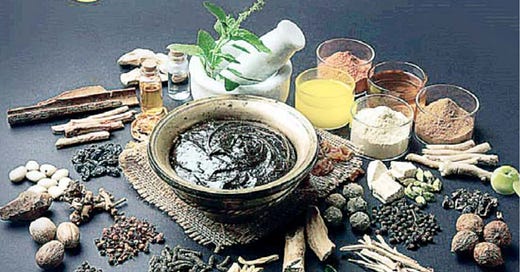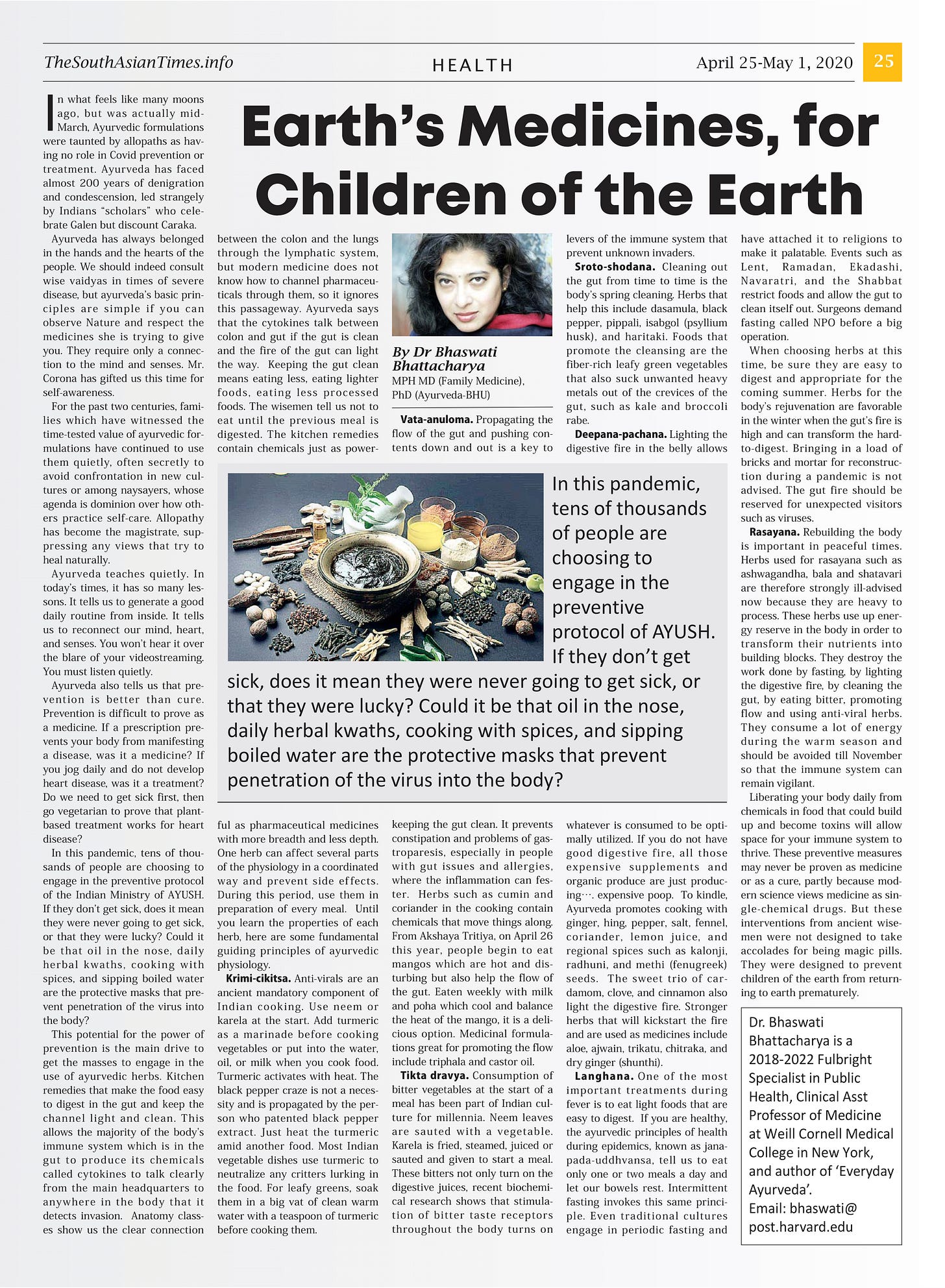The medicine of the Earth and of the People
The fundamental guiding principles of ayurveda tell us that one herb can affect several parts of the physiology in a coordinated way and prevent side effects. … These herbs are understood by Ayurveda and have always belonged in the hands and hearts of the people. They help reconnect our mind, heart, and senses to the importance of taking care of the Earth.
Earth’s Medicines, on Earth Day, for Children of the Earth
In what feels like many moons ago, but was actually mid-March, Ayurvedic formulations were taunted by allopaths as having no role in Covid prevention or treatment. Ayurveda has faced almost 200 years of denigration and condescension, led strangely by Indians “scholars” who celebrate Galen but discount Caraka.
Ayurveda has always belonged in the hands and the hearts of the people. We should indeed consult wise vaidyas in times of severe disease, but ayurveda’s basic principles are simple if you can observe Nature and respect the medicines she is trying to give you. They require only a connection to the mind and senses. Mr. Corona has gifted us this time for self-awareness.
For the past two centuries, families who have witnessed the time-tested value of ayurvedic formulations have continued to use them quietly, often secretly to avoid confrontation in new cultures or among naysayers, whose agenda is dominion over how others practice self-care. Allopathy has become the magistrate, suppressing any views that try to heal naturally.
Ayurveda teaches quietly. In today’s times, it has so many lessons. It tells us to generate a good daily routine from inside. It tells us to reconnect our mind, heart, and senses. You won’t hear it over the blare of your videostreaming. You must listen quietly.
Ayurveda also tells us that prevention is better than cure. Prevention is difficult to prove as a medicine. If a prescription prevents your body from manifesting a disease, was it a medicine? If you jog daily and do not develop heart disease, was it a treatment? Do we need to get sick first, then go vegetarian to prove that plant-based treatment works for heart disease?
In this pandemic, tens of thousands of people are choosing to engage in the preventive protocol of AYUSH. If they don’t get sick, does it mean they were never going to get sick, or that they were lucky? Could it be that oil in the nose, daily herbal kwaths, cooking with spices, and sipping boiled water are the protective masks that prevent penetration of the virus into the body?
This potential for the power of prevention is the main drive to get the masses to engage in the use of ayurvedic herbs. Kitchen remedies that make the food easy to digest in the gut and keep the channel light and clean. This allows the majority of the body’s immune system which is in the gut to produce its chemicals called cytokines to talk clearly from the main headquarters to anywhere in the body that it detects invasion. Anatomy classes show us the clear connection between the colon and the lungs through the lymphatic system, but modern medicine does not know how to channel pharmaceuticals through them, so it ignores this passageway. Ayurveda says that the cytokines talk between colon and gut if the gut is clean and the fire of the gut can light the way. Keeping the gut clean means eating less, eating lighter foods, eating less processed foods. The wisemen tell us not to eat until the previous meal is digested.
The kitchen remedies contain chemicals just as powerful as pharmaceutical medicines with more breadth and less depth. One herb can affect several parts of the physiology in a coordinated way and prevent side effects. During this period, use them in preparation of every meal.
Until you learn the properties of each herb, here are some fundamental guiding principles of ayurvedic physiology.
Krimi-cikitsa. Anti-virals are an ancient mandatory component of Indian cooking. Use neem or karela at the start. Add turmeric as a marinade before cooking vegetables or put into the water, oil, or milk when you cook food. Turmeric activates with heat. The black pepper craze is not a necessity and is propagated by the person who patented black pepper extract. Just heat the turmeric amid another food. Most Indian vegetable dishes use turmeric to neutralize any critters lurking in the food. For leafy greens, soak them in a big vat of clean warm water with a teaspoon of turmeric before cooking them.
Vata-anuloma. Propagating the flow of the gut and pushing contents down and out is a key to keeping the gut clean. It prevents constipation and problems of gastroparesis, especially in people with gut issues and allergies, where the inflammation can fester. Herbs such as cumin and coriander in the cooking contain chemicals that move things along. From Akshaya Tritiya, on April 26 this year, people begin to eat mangos which are hot and disturbing but also help the flow of the gut. Eaten weekly with milk and poha which cool and balance the heat of the mango, it is a delicious option. Medicinal formulations great for promoting the flow include triphala and castor oil.
Tikta dravya. Consumption of bitter vegetables at the start of a meal has been part of Indian culture for millenia. Neem leaves are sauteed with a vegetable. Karela is fried, steamed, juiced or sauteed and given to start a meal. These bitters not only turn on the digestive juices. Recent biochemical research shows that stimulation of bitter taste receptors throughout the body turns on levers of the immune system that prevent unknown invaders.
Sroto-shodana. Cleaning out the gut from time to time is the body’s spring cleaning. Herbs that help this include dasamula, black pepper, pippali, isabgol (psyllium husk), and haritaki. Foods that promote the cleansing are the fiber-rich leafy green vegetables that also suck unwanted heavy metals out of the crevices of the gut, such as kale and broccoli rabe.
Deepana-pachana. Lighting the digestive fire in the belly allows whatever is consumed to be optimally utilized. If you do not have good digestive fire, all those expensive supplements and organic produce are just producing…. expensive poop. To kindle, Ayurveda promotes cooking with ginger, hing, pepper, salt, fennel, coriander, lemon juice, and regional spices such as kalonji, radhuni, and methi (fenugreek) seeds. The sweet trio of cardamom, clove, and cinnamon also light the digestive fire. Stronger herbs that will kickstart the fire and are used as medicines include aloe, ajwain, trikatu, chitraka, and dry ginger (shunthi).
Langhana. One of the most important treatments during fever is to eat light foods that are easy to digest. If you are healthy, the ayurvedic principles of health during epidemics, known as janapada-uddhvansa, tell us to eat only one or two meals a day and let our bowels rest. Intermittent fasting invokes this same principle. Even traditional cultures engage in periodic fasting and have attached it to religions to make it palatable. Events such as lent, Ramadan, ekadashi, navaratri, and the shabbat restrict foods and allow the gut to clean itself out. Surgeons demand fasting called NPO before a big operation.
When choosing herbs at this time, be sure they are easy to digest and appropriate for the coming summer. Herbs for the body’s rejuvenation are favorable in the winter when the gut’s fire is high and can transform the hard-to-digest. Bringing in a load of bricks and mortar for reconstruction during a pandemic is not advised. The gut fire should be reserved for unexpected visitors such as viruses.
Rasayana. Rebuilding the body is important in peaceful times. Herbs used for rasayana such as ashwagandha, bala and shatavari are therefore strongly ill-advised now because they are heavy to process. These herbs use up energy reserve in the body in order to transform their nutrients into building blocks. They destroy the work done by fasting, by lighting the digestive fire, by cleaning the gut, by eating bitter, promoting flow and using anti-viral herbs. They consume a lot of energy during the warm season and should be avoided til November so that the immune system can remain vigilant.
Liberating your body daily from chemicals in food that could build up and become toxins will allow space for your immune system to thrive. These preventive measures may never be proven as medicine or as a cure, partly because modern science views medicine as single-chemical drugs. But these interventions from ancient wisemen were not designed to take accolades for being magic pills. They were designed to prevent children of the earth from returning to earth prematurely.
wk5 column. TheSouthAsianTimes
Obtain a pdf version of this column by clicking on the following image:
Dr. Bhaswati Bhattacharya is a Fulbright Specialist 2018‐2023 in Public Health. She serves as Clinical Asst Professor of Family Medicine in the Department of Medicine at Weill Cornell Medical College in New York, NY. Her bestselling book Everyday Ayurveda is published by Penguin Random House. To order an autographed copy, write to bhaswati@post.harvard.edu .





